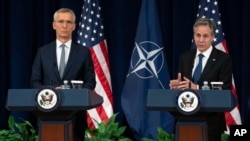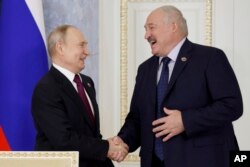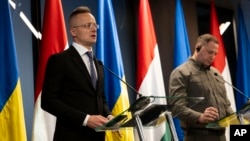U.S. Secretary of State Antony Blinken warned Monday that Ukraine’s defensive war against Russia was at risk without a new round of aid approved by Congress.
“Without it, simply put, everything that Ukrainians achieved and that we’ve helped them achieve will be in jeopardy,” Blinken said at a joint news conference with NATO Secretary-General Jens Stoltenberg in Washington.
The NATO chief expressed confidence that the U.S. will continue to support Ukraine, reminding everyone that it is in the interest of the U.S. to ensure that Russia does not win in Ukraine.
Stoltenberg also said that aiding Ukraine is a joint effort with NATO allies and that it is not viewed as charity but as “an investment in our own security.”
During a TV interview with Fox News Sunday, Stoltenberg also said that a win by Russia would also embolden a land grab by other authoritarian regimes in other parts of the world, adding that Beijing is watching closely NATO’s response to Putin’s invasion of Ukraine.
“Today, it’s Ukraine. Tomorrow, it might be Taiwan," the NATO chief said.
Stoltenberg said Sunday that NATO’s 2024 military exercises, the largest since World War II, are meant to prevent war and not to provoke war.
Operation Steadfast Defender 24 will see about 90,000 NATO military personnel take part in a range of drills across Europe in the coming months. Fifty naval vessels, 80 aircraft and over 1,100 combat vehicles will be involved.
OCHA-Ukrainian relief
The U.N. Office for the Coordination of Humanitarian Affairs reports that attacks Monday and over the weekend in Ukraine are causing further suffering for civilians already enduring harsh winter conditions.
Ukrainian officials said more than a dozen civilians were reportedly killed or injured in attacks in eastern, central and southern Ukraine over the past three days. These attacks also impacted homes, schools, a hospital and energy infrastructure.
In the eastern region of Kharkiv, authorities said shelling caused damage to homes and electrical grids. In the southern region of Kherson, attacks over the weekend also damaged homes, as well as education and telecommunications facilities, according to the governor of the oblast.
The U.N. and partners continue to provide urgent humanitarian assistance to people in these areas.
Overall last year, the U.N. and partners sent 107 humanitarian convoys to support about 400,000 residents in front-line communities in eastern and southern Ukraine.
Earlier Monday, Ukraine said its air defenses downed eight drones launched by Russia in overnight attacks.
The Ukrainian air forces said the drones were destroyed over multiple regions of the country, including Mykolaiv, Dnipropetrovsk, Khmelnytskyi and Rivne.
In addition to the drones, the Russian attacks also included three S-300 missiles.
Russian-Belarus alliance
Russian President Vladimir Putin met Monday with his Belarusian counterpart, Alexander Lukashenko, to discuss expanding their alliance, which has already seen the deployment of some of Russia's nuclear weapons on the territory of its neighbor.
Putin emphasized the two countries’ “strategic partnership” as part of their 25-year union agreement involving political, economic and military ties between the two nations.
“It's important that amid an unprecedented foreign pressure, Russia and Belarus have closely cooperated on the international arena and have offered unfailing support to each other as true allies,” Putin said at the start of the talks in St. Petersburg that involved senior officials from both countries.
Lukashenko has relied on Russian subsidies and political support to rule the ex-Soviet nation with an iron hand for nearly three decades. Moscow's backing helped Lukashenko survive months of major protests of his reelection in a 2020 vote that the opposition and the West saw as rigged.
Lukashenko allowed the Kremlin to use Belarusian territory to send troops into Ukraine in February 2022.
Hungary-Ukraine talks
Hungary indicated Monday that it is ready for a compromise allowing a proposed European Union aid package of $54 billion for Ukraine to be financed from the bloc's budget ahead of an emergency summit on Thursday.
Prime Minister Viktor Orban has been a vocal critic of the EU's financial and military support for Kyiv and maintained close ties with the Kremlin since Russia invaded neighboring Ukraine in February 2022.
If Hungary does not agree on the package, EU leaders have proposed an alternative plan involving a deal between 26 members and Ukraine, which would also deny Budapest access to linked EU funds.
Hungarian Foreign Affairs Minister Peter Szijjarto met with his Ukrainian counterpart, Dmytro Kuleba, in Kyiv to discuss the aid and to address restrictions on the rights of the ethnic Hungarian community in the western Ukrainian region of Zakarpattia to study in their native language.
Hungary has an “expectation that the members of the Hungarian national community will regain their rights that already existed in 2015,” the Hungarian official said, adding, “We still have a long way to go, but we on the Hungarian side are ready to do this work.”
Kuleba said he considered the question of the Hungarian minority “fundamentally resolved,” but that a joint committee will be established to examine how Kyiv can address Budapest's further demands concerning Ukraine's Hungarian community and present those findings to the respective governments in 10 days.
This was Szijjarto’s first visit to Ukraine since Russia’s invasion in February 2022 and the only official bilateral meeting between the two officials in the last two years.
Some material for this report came from The Associated Press, Agence France-Presse and Reuters.







